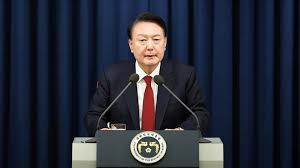
South Korean President Yoon Suk Yeol has been impeached by the National Assembly on charges of insurrection, following his controversial attempt to impose martial law earlier this month.
The impeachment motion, which required a two-thirds majority, passed with 204 out of 300 lawmakers voting in favor. Eight votes were nullified, three lawmakers abstained, and 85 opposed the motion. This marks a dramatic turning point in South Korean politics, as Yoon’s presidential powers have now been suspended, with Prime Minister Han Duck-soo assuming the role of interim president.
Martial Law Controversy Sparks Outrage
The impeachment comes after Yoon’s attempt to impose martial law on December 3, citing the need to eliminate domestic political support for North Korea. The move was widely condemned as a threat to democracy, with critics accusing Yoon of rebellion. The martial law bid led to widespread protests across Seoul, with demonstrators demanding Yoon’s resignation and arrest.
Yoon’s approval ratings had already plummeted to a record low of 11%, and the fallout from his actions has plunged South Korea into a political crisis. “This was a high-risk gamble that endangered national stability,” said one political analyst, referencing the accusations of riots and threats against the National Assembly and the public.
Constitutional Court to Decide Yoon’s Fate
The Constitutional Court now has up to 180 days to decide whether to uphold Yoon’s impeachment. If the court confirms his removal, Yoon will become the second South Korean president to be impeached in history, triggering a presidential election within 60 days.
Security Concerns Amid Political Turmoil
Yoon’s actions have also raised alarms about South Korea’s ability to handle security threats. The former defense minister has been arrested, and several top military officials are under investigation. With tensions already high on the Korean Peninsula, the political upheaval has left South Korea vulnerable.
The metropolitan government of Seoul has deployed 1,000 safety personnel to maintain order as the crisis unfolds. Observers warn that prolonged instability could undermine South Korea’s defense posture amid ongoing threats from North Korea.
As the nation awaits the Constitutional Court’s ruling, South Korea faces a critical juncture in its political history, with its democratic principles and national security hanging in the balance.
Sources By Agecies


